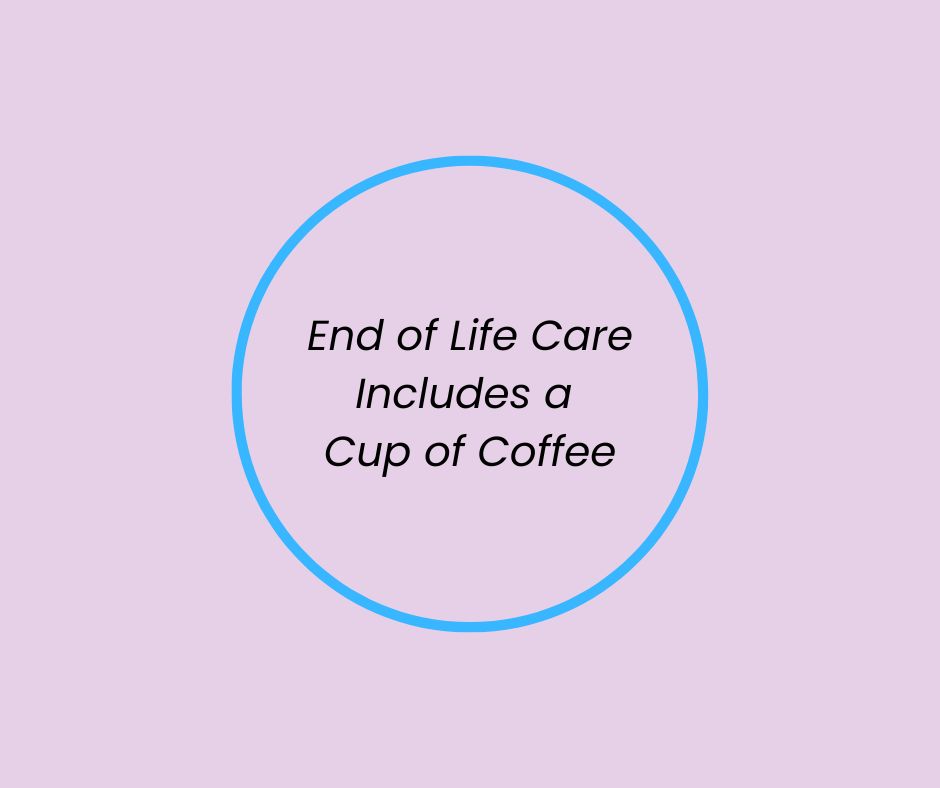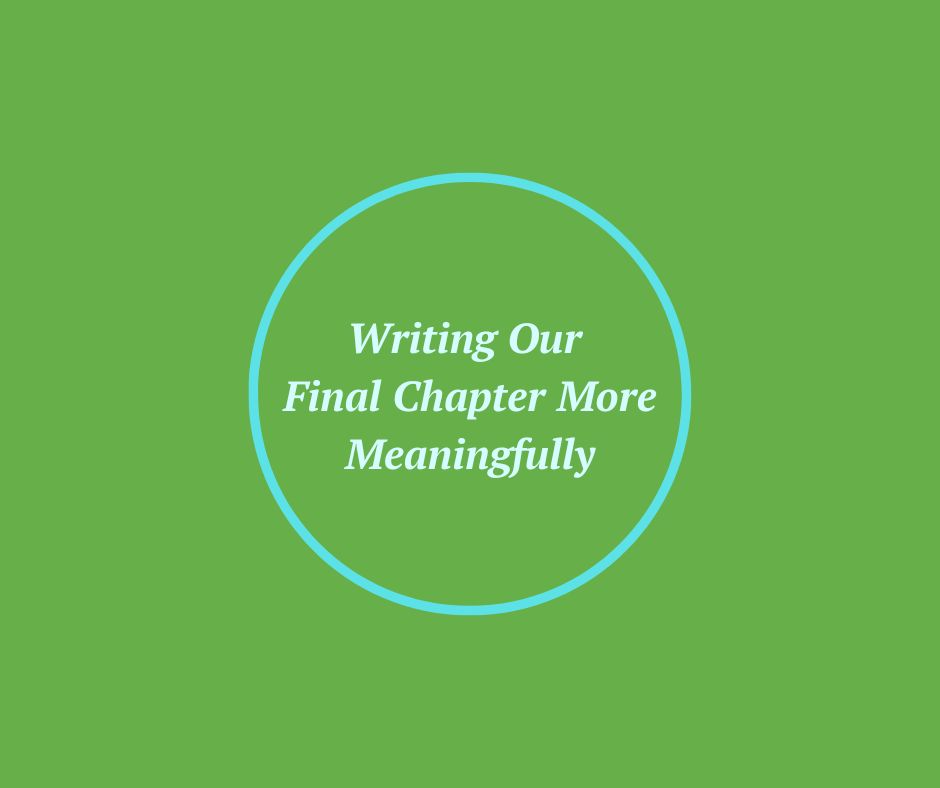Dear Barbara, you write about the signs of approaching death for what you call a “gradual” death. Would you write about what happens during a “sudden” death?
There are two ways to die: gradual, from disease or old age; or a fast, unexpected death. I’ve written a lot about gradual death and its process, about what to look for in the months, weeks, days and hours before death comes.
I haven’t written about sudden, unexpected death. There really isn’t a lot to say. There is no process, no preparation, no labor, no signs it is coming. The person is alive one minute and dead the next. Sudden death could come from a heart attack. It could come from a traffic accident, gunshot, or explosion, to name a few.
With immediate death there is nothing -- no breathing, no awareness. BUT what about when death is going to be the result of a sudden incident, but death is not immediate? What happens and what do we look for when death will come in hours, even days? What does fast death look like then?
The signs of approaching death then are the same as a gradual death. If it is hours, there can be facial expression changes, eyes may be partially open, breathing may be erratic, and the person may be non-responsive. If it is days, the signs will be the same as days before a gradual death.There may be mottling (blueish, dark color to hands and feet), start-and-stop breathing, and a lack of awareness of their surroundings.
How do we interact with someone dying a sudden death? The same way we would react with someone dying a gradual death. In the minutes to hours before any death, I believe the person can hear -- they may not be able to acknowledge or respond -- but they can hear. Speak to them, tell them what is happening, what you or others are going to do. “I’m going to lift your body out of the car. We are taking you to the hospital. I’m going to hold your hand. You will not be alone.” Speak reassuring words that will bring comfort.
As I continually say, “dying is not like in the movies.” A person in the hours, even days before death, whether it is gradual or unexpected, is not going to be saying goodbye, or any meaningful words. They will not be aware of their surroundings. This physical world is no longer where their work is centered.
Something More about… When Death Comes Suddenly: What to Expect and How to Offer Comfort
To understand how to support someone who is facing gradual death from disease or old age, I suggest you educate yourself with my End of Life Family Support Bundle. This bundle will give you the essential tools to navigate every aspect of this journey, from understanding the dying experience to providing comfort and pain management. By purchasing the Family Support Bundle, you're equipping yourself with knowledge, compassion, and the peace of mind that comes with being well-prepared.








3 comments
Barbara Steer
I’ve been wondering if the inability to respond is the same as not being aware. When a person dies of cardiac arrest, it is said that, in the absence of successful resuscitation, there is permanent brain damage, and brain death, after 10 mins. So when a person dies, isn’t the brain still alive, though dying, during that time? We living people say the “death rattle” doesn’t bother the dying, but as a living, sensing person, an uncleared throat is bothersome to me. And the “fish-out-of-water” breathing. We say, it doesn’t distress the dying. How do we know?
———
BK Books replied:
Hi Barbara, such a powerful, thought provoking question. I guess the bottom line is we really don’t know anything “for sure” until it is our time to experience dying. I like to operate under the premise they can hear and encourage goodbyes. Nothing to lose if they can’t. I also believe if pain is an issue then treat the pain even if the person is non responsive. Err on the side of comfort. Blessing! Barbara
I’ve been wondering if the inability to respond is the same as not being aware. When a person dies of cardiac arrest, it is said that, in the absence of successful resuscitation, there is permanent brain damage, and brain death, after 10 mins. So when a person dies, isn’t the brain still alive, though dying, during that time? We living people say the “death rattle” doesn’t bother the dying, but as a living, sensing person, an uncleared throat is bothersome to me. And the “fish-out-of-water” breathing. We say, it doesn’t distress the dying. How do we know?
———
BK Books replied:
Hi Barbara, such a powerful, thought provoking question. I guess the bottom line is we really don’t know anything “for sure” until it is our time to experience dying. I like to operate under the premise they can hear and encourage goodbyes. Nothing to lose if they can’t. I also believe if pain is an issue then treat the pain even if the person is non responsive. Err on the side of comfort. Blessing! Barbara
Paula
As you may remember, Barbara, my precious one made his transition and crossed over in 24 hours. It was not evident to me or to anyone else that he was actually transitioning, as for all but about 3 hours, he was still talking to me and answering me. His cause of death was internal bleeding from cancer. A part of my trauma is realizing I had not gotten to say good-bye or tell him, once again, how much I loved him and vice-versa. That was VERY difficult! I did get a chance to whisper some loving words in his ear for a few minutes, but he did not respond. (And I have no idea what I said). Anyway, it’s true, one can’t plan for a sudden death and then what I call the hauntings come. What if I had done x, y, or z? What if I had overridden his desire to not go to the hospital just 6 hours before he expired? No need to go through them now—I’ve already reviewed every single one. Thanks for letting me express, yet once more, how shocking sudden death can be to the ones left to think about things in the material realm.
———
BK Books replied:
Hi Paula, Oh the words we wish we had said. You might write your husband a letter. Put all the words, thoughts and tears on paper. Write everything you wish you had said, then burn the paper and scatter the ashes to the wind. Let how well you live your life now be the gift of love you give your husband.. Blessings! Barbara
As you may remember, Barbara, my precious one made his transition and crossed over in 24 hours. It was not evident to me or to anyone else that he was actually transitioning, as for all but about 3 hours, he was still talking to me and answering me. His cause of death was internal bleeding from cancer. A part of my trauma is realizing I had not gotten to say good-bye or tell him, once again, how much I loved him and vice-versa. That was VERY difficult! I did get a chance to whisper some loving words in his ear for a few minutes, but he did not respond. (And I have no idea what I said). Anyway, it’s true, one can’t plan for a sudden death and then what I call the hauntings come. What if I had done x, y, or z? What if I had overridden his desire to not go to the hospital just 6 hours before he expired? No need to go through them now—I’ve already reviewed every single one. Thanks for letting me express, yet once more, how shocking sudden death can be to the ones left to think about things in the material realm.
———
BK Books replied:
Hi Paula, Oh the words we wish we had said. You might write your husband a letter. Put all the words, thoughts and tears on paper. Write everything you wish you had said, then burn the paper and scatter the ashes to the wind. Let how well you live your life now be the gift of love you give your husband.. Blessings! Barbara
Sheryl Schowengerdt
Dear Barbara,
My husband and I read your booklets before he died and a Time to Live hd a profound impact on the last seven weeks of his life. While he was at end-stage kidney cancer, he had a “rally” or sorts and was strong enough to have surgery to place a stent between his gallbladder and stomach to get rid of a biliary tube placed after a gallstone blocked his gallbladder. And he hated that blasted tube – his left shoulder had a pathologic break and he had that tube out his right side.
It was an outpatient surgery and we had planned to take a vacation afterward to make the best use of remaining time. The stent dislodged and he died that night. Even with end-stage disease, you’re never prepared to hear the trauma surgeon tell you your spouse may live through the night.
For me, it’s been good to focus on the fact that even those he was in incredible pain his last 12 hours, he was spared the prolonged suffering that most likely awaited him.
Thank you for your guidance – we’ve shared it with hospice patience in several stated.
———
BK Books replied:
Hi Sheryl, it seems life never goes the way we expect. I am pleased you both found guidance in living the best you could under the circumstances life gave you. Blessings! Barbara
Dear Barbara,
My husband and I read your booklets before he died and a Time to Live hd a profound impact on the last seven weeks of his life. While he was at end-stage kidney cancer, he had a “rally” or sorts and was strong enough to have surgery to place a stent between his gallbladder and stomach to get rid of a biliary tube placed after a gallstone blocked his gallbladder. And he hated that blasted tube – his left shoulder had a pathologic break and he had that tube out his right side.
It was an outpatient surgery and we had planned to take a vacation afterward to make the best use of remaining time. The stent dislodged and he died that night. Even with end-stage disease, you’re never prepared to hear the trauma surgeon tell you your spouse may live through the night.
For me, it’s been good to focus on the fact that even those he was in incredible pain his last 12 hours, he was spared the prolonged suffering that most likely awaited him.
Thank you for your guidance – we’ve shared it with hospice patience in several stated.
———
BK Books replied:
Hi Sheryl, it seems life never goes the way we expect. I am pleased you both found guidance in living the best you could under the circumstances life gave you. Blessings! Barbara